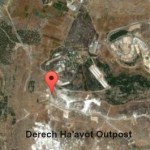 For the first time, the government is requesting to officially take over private Palestinian land
in order to legalize an unauthorized outpost, which is built, in part, on private Palestinian land. The request
was presented to the Supreme Court as part of the State's reply to a petition filed by Peace Now and Palestinian
land owners, against 17 houses built on private Palestinian lands in the Derech Ha'avot Ouptost, near
Bethlehem. The first hearing of the case will take place next Monday, 22 June at 9:00am.
For the first time, the government is requesting to officially take over private Palestinian land
in order to legalize an unauthorized outpost, which is built, in part, on private Palestinian land. The request
was presented to the Supreme Court as part of the State's reply to a petition filed by Peace Now and Palestinian
land owners, against 17 houses built on private Palestinian lands in the Derech Ha'avot Ouptost, near
Bethlehem. The first hearing of the case will take place next Monday, 22 June at 9:00am.
Key points:
- The Government is asking to consider the settlers' proposal to take over the lands by a "re-parcellation" procedure (AKA "unification and division"), which unites a few parcels together and enables to swap lands between owners. This way the settlers would receive the Palestinian lands and the Palestinian owners will be compensated by adjacent lands. This is a kind of legal acrobatics that is meant to confiscate the lands without calling it a confiscation.
- The State Attorney, representing the government, indicated in its response that legalizing the takeover of private Palestinian lands for the use of settlements was discussed in the past in the Justice Ministry but was defined as legally problematic. However, the State Attorney stressed that due to the political demand to adopt this action, it is now asking the court to allow the State another 90 days to consider the suggested solution.
- This suggested land-swap is in fact an implementation of the suggested legislations, from past and present ("the regulation law"), which have never succeeded to go through due to their unethical and unlawful consequences, that ask to enable taking private lands from Palestinian owners without their consent in return for some sort of compensation, in order to legalize settlements.
- If accepted, this will allow settlers to build in free will, regardless of the ownership of the lands, knowing that in any case, even private lands can be retroactively legalized. In addition, it will also allow the retroactive legalization of the many outposts and settlements that have been built on private Palestinian lands in the past.
The recent background of this case is the government’s declaration of 984 dunams of lands as “state lands” back in
April, 2014. The declaration came, among others, in order to allow the retroactive legalization of Derech Haavot
outpost. However, the declaration did not include 17 settler homes in the outpost, maintaining that they are built
on private Palestinian lands. While Palestinians that were affected by the declaration are still trying to reverse
it in an appeal which is still pending, Peace Now and Palestinian owners of the lands where the 17 settler homes
are built, petitioned to the Supreme Court for the immediate removal of the 17 houses, stressing that there is no
plausible reason why these houses should remain.
In its response to the petition, the government described that it wishes to consider the adoption of a planning
proposal, suggested by the settler Gush Etzion council, that asks to do a re-parcellation of the lands in the area,
and to compensate the Palestinian owners with other lands.